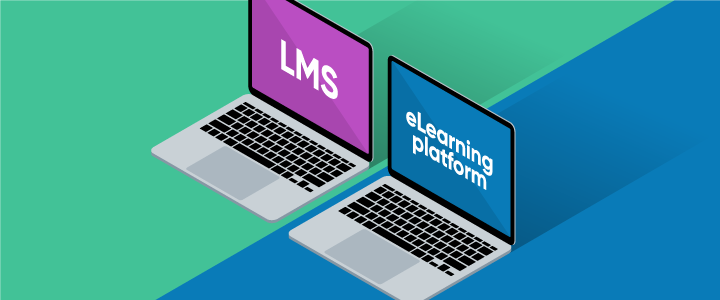
4 min reading time
eLearning Platform vs LMS - What’s the Difference?
There are lots of terms to describe software products like LearnUpon. The one we use most frequently is “LMS” (learning management system). Why? Simply because LMS is the most well-known term to describe our product and its features.
If you’re new to the eLearning realm or researching an eLearning solution, you may come across vendors using various terms, such as eLearning platform, and a number of others. And that’s where the confusion starts! We don’t use another term, “eLearning platform”, as frequently, but that doesn’t mean that LearnUpon isn’t one.
In this post, we’re going to take you through the differences between an LMS and an eLearning platform, some misconceptions that exist around their definitions, and how the whole matter may boil down to preferred terminology.
Defining eLearning terms
First, let’s establish some definitions. Wikipedia defines an LMS as “a software application for the administration, documentation, tracking, reporting and delivery of education courses, training programs, or learning and development programs.”
It’s clear for anyone familiar with LearnUpon, that it satisfies the above criteria. So, we have a starting point. LearnUpon is definitely an LMS. There is no universally accepted definition of what an “eLearning platform” actually is, however. Wikipedia doesn’t have a page dedicated to the term, and vague definitions on other websites range from “an online service that supports and enhances the delivery of training”, to “a system designed to create a virtual learning environment through which courses can be delivered and monitored.”
A platform is usually a base to work from, or it’s integrated across your learning needs. That would indicate that the product in question must be connected to other software. Once again you can see that LearnUpon begins to check off all of these requirements. LearnUpon sits at the center of your eLearning ecosystem, with other systems connected to it. This enables you to build entire, multi-faceted training programs, upon it. And yes, that’s where the last four letters of our name comes from!
Why companies use the term eLearning platform
As you can see, this is quite a subjective topic. It’s easy to see how some people become bewildered when trying to definitively interpret what the differences are. And what is the source of the confusion? Vendors. eLearning software vendors have begun to use the terms eLearning platform and LMS interchangeably.
Why? Well, for a number of perceived competitive advantages. Here are some of the scenarios where using the term “eLearning platform” is deemed to be better than just the good old LMS:
- It is actually a platform
- It’s not a platform, but the vendor wants to differentiate themselves away from an uber-competitive space
- It’s not a platform, but the vendor doesn’t know the difference
Sometimes, the purpose is as simple as trying to hide that the software is missing a key piece of LMS functionality. Calling it a more vague term muddies the waters and protects it from unfavorable comparisons. If a product isn’t able to track the progress of learners, it’s missing a defining feature of an LMS. To avoid that glaring omission, a different term is used.
Then there are vendors who are just trying to get some breathing room in an industry of over 700 competitors. The use of the term “eLearning platform” isn’t automatically a bad thing. It doesn’t necessarily mean the product on offer is sub-par, or that they’re masquerading as something they’re not. More often than not, it’s just being used incorrectly. Let’s delve into some of the reasons for that.
Functionality
Are an LMS and an eLearning platform the same in terms of functionality? Unfortunately, once again, it depends. If we look at the LMS definition mentioned above, there are a couple of elements involved; administration, documentation, tracking, reporting, and delivery. LearnUpon, and other prominent LMSs, meet and exceed the requirements of this definition, and so we call ourselves an LMS.
Some vendors, however, can’t provide all these services. They sometimes then call themselves an eLearning platform to remain competitive in the market. You can often find basic solutions out there that are classed as “eLearning platforms”, on which you can upload and distribute content, but they lack in terms of administration, tracking and reporting components.
Searchability and variation
Not everyone who needs an eLearning solution is familiar with eLearning. For many buyers, it’s their first time delving into such a complicated industry. They may use a variety of terms when researching a system. We sometimes use other terms, including “eLearning platform” to align ourselves with the language used by searchers. This is basic optimization for search engines, otherwise known as SEO.
We use a variety of terms across our website and blog posts to try to cover many of the terms LMS buyers may be familiar with. And sometimes, LMS vendors use “eLearning platform” just for variation. It helps to avoid monotony. In a 2,000 word blog post, constant use of the term “an LMS” or “a learning management system” can become a little repetitive!
Terminology
As we can see from above, establishing differences between an LMS and an eLearning platform is complex, and more often than not, it comes down to chosen terminology. In essence, an LMS is a type of platform, because a platform is a base to work from.
All LMSs could be considered eLearning platforms, but not all eLearning platforms are specific enough to be considered an LMS. To be a true eLearning platform, an LMS should sit at the heart of your learning strategy. It should be the starting point for all training activities and learning opportunities, including:
- Course creation
- Content storage
- Enrollment process
- Delivery
- Taking courses
- Gamification
- Discussion
- Social sharing
- Certification
- Reporting
So, when it comes to the differences between an LMS and an eLearning platform, all the reasons above should be taken into account. Simply put:
- Some are an LMS and an eLearning platform
- Some are just an LMS
- Some are just a website, or another basic tool, that call themselves a platform
Here, at LearnUpon, we believe that for a system to be classified as an LMS, the proof is in what it offers beyond the core functionality for providing eLearning. It’s the advanced administration, reporting, tracking, and integrations that fill the brief of what an LMS should be. Why not see our own LMS in action? Book your free trial and demo today.



